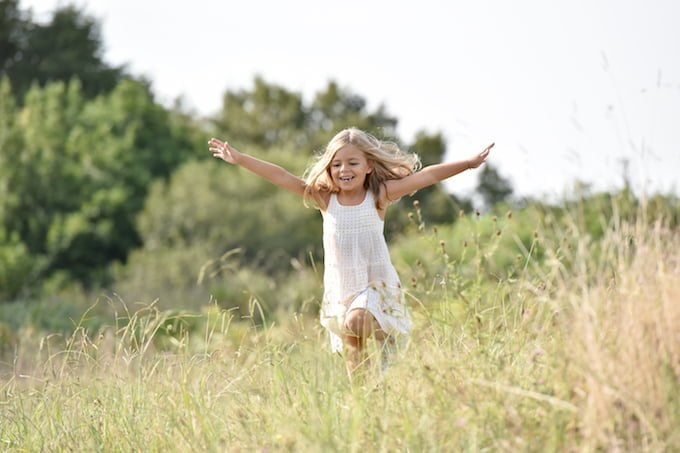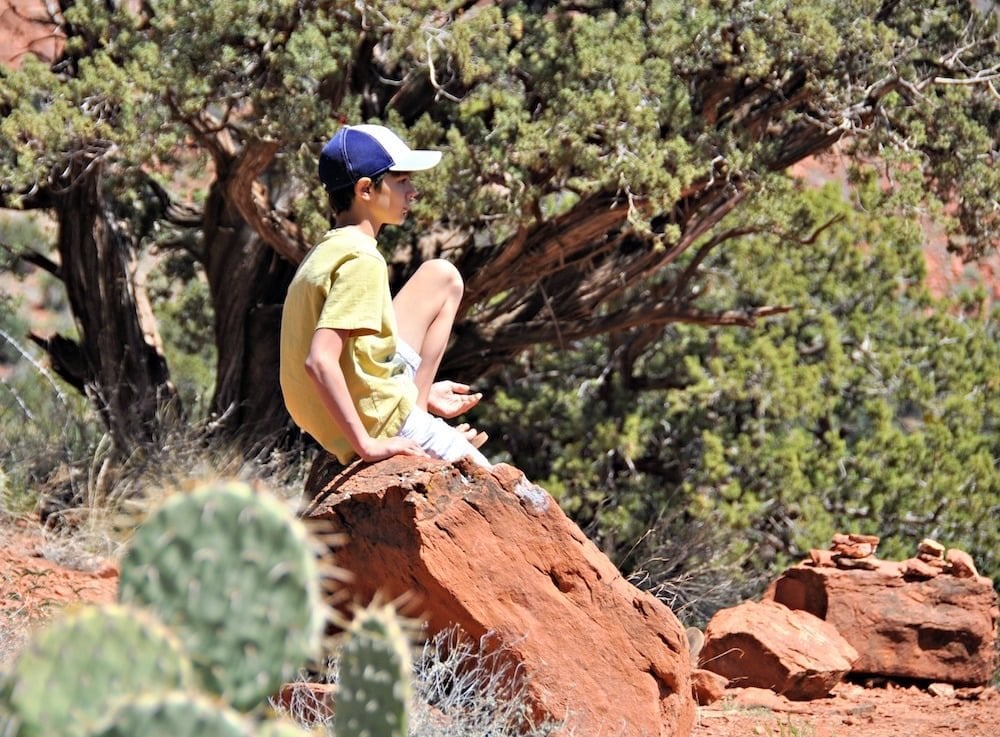Why + How to Embrace Minimalist Parenting
Could your family enjoy life more by doing less? Minimalist parenting invites parents to cut through the clutter of more, and edit activities and belongings down to what’s truly important.
Experts say too much materialism can have a harmful effect on children, but it’s not exactly easy to create a minimalist household if you are not one yourself. Here’s how you can raise kids who understand what really matters.

Why Minimalist Parenting?
For many years, the parenting climate has been all about more. More expert advice, more gear, more competition, more fears about safety, and more choices to make about education, nutrition, and even entertainment.
The result?
Overwhelmed, confused parents and over-scheduled, over-parented kids.
Fifteen minutes of decision-making here and there may not sound like much, but all the time and attention lost managing the barrage of choices thrown at you each day adds up fast. More than that, the mental clutter that results casts a shadow over everything.
In their book Minimalist Parenting, Christine Koh and Asha Dornfest offer a fresh approach to navigating the conflicting background noise.
How Minimalism Can Apply to Parenting
The Minimalists, authors Joshua Fields Millburn and Ryan Nicodemus, describe minimalism as:
Minimalism is a tool to rid yourself of life’s excess in favor of focusing on what’s important—so you can find happiness, fulfillment, and freedom.
In practice, it can take on many different forms. From people who live with less than 100 items to those who keep a capsule wardrobe that takes early morning decision making out of the equation.
Over-parenting is not only exhausting for you, it stifles your child’s creativity. New studies are showing how the tiger parenting phenomenon could even lead to long-term mental health issues. “Children raised by authoritarian parents are showing maladaptive outcomes, such as depression, anxiety and poor social skills,” said Qing Zhou, an assistant professor of psychology at UC Berkeley who heads the campus’s Culture and Family Laboratory.
Studies show 75% of parents are too busy to read to their children at night, shares Joshua Becker, author of The More of Less: Finding the Life You Want Under Everything You Own. There is a rising number of children being placed in day cares and after-school activities.
Americans are having a hard time finding opportunity for vacations these days. About 33% of Americans are living with extreme stress daily. And nearly 50% of Americans say they regularly lie awake at night because of stress.
This is a problem. We have become too busy.
What if you weren’t consumed by this excess? What if your kids had plenty of time and breathing space and felt empowered to make their own choices?
When you simplify your child’s world, you help them become aware of the present moment and you give them the space to let their imagination blossom.
It doesn’t mean you let them wander the forest unsupervised, but with some freedom from excessive scheduling or stuff, your child has the chance to truly flourish.
Give Your Child Space
Most kids are used to being busy, so when they aren’t being taught, coached, or entertained by a screen, they may find themselves bored. And their boredom probably won’t lead them to immediately enjoy stillness. They will most likely ask you for more distractions and entertainment.
Nonetheless, teaching your kids to do nothing, to deeply relax and calm their minds, will make them less stressed and more in tune with themselves. And it’s probably not going to be as difficult to teach as you fear.
“Doing nothing for kids should be the same as it is for adults: simple, fun, and easy,” explains Rachel Jonat in The Joy of Doing Nothing: A Real-Life Guide to Stepping Back, Slowing Down, and Creating a Simpler, Joy-Filled Life. So start your children out with age-appropriate and kid-specific short breaks to relax. Make your initial attempts very brief: ask them to do just three minutes of a calm and restful activity like sitting and imagining themselves at their favorite park or beach or watching clouds outside.
Ask them to sit quietly and think of just one thing, like a relaxing and positive experience or hobby. The older the child, the longer these sessions of doing nothing can be.
Apply a “Do Less” Approach to Playtime
Once your child adapts to minimalism, their creativity will be sparked, and they will move on from their breaks to deep creative, mental, or physical play. This brain reboot will remove their distractions and allow them to engage in the kind of play and activity that feeds their brain and body.
For younger children, doing nothing will lead them to the kind of open-ended, limited-toy, imagination- and nature-focused play that they need for proper development. For teenagers, doing nothing can be the perfect lead-in to studying and homework or even to sports or music practice.
In pediatric occupational therapist Angela J. Hanscom’s book Balanced and Barefoot: How Unrestricted Outdoor Play Makes for Strong, Confident, and Capable Children, she recommends three hours a day of outdoor play for children for optimal development.
Hanscom notes that today’s modern children spend so much time indoors participating in structured activities and screen time that they don’t at first know how to play outdoors.
Children need time to warm up to open-ended creative and physical play, particularly if they aren’t doing this kind of play regularly. If you want your children to spend more time outdoors or in open-ended play, a brief session of doing nothing could be their entry point. Use that distraction-free time, even a brief five minutes, to help your children reset.
When you dictate what happens in playtime, you’re undermining your child’s independence and ability to think for (and entertain) themselves. Children are able to be more creative and flex their imaginations when given fewer toy choices. After all, Einstein said, “The true sign of intelligence is not knowledge but imagination.”
Allow Your Child to Make Decisions
Laying off the constant control of your child’s life doesn’t mean letting them eat ice cream and watch television for days on end. It means giving them more free play time and letting them pick what sort of activities they want to do.

Is a full schedule of ballet, karate, swim lessons, and Mandarin really what they want? Letting them choose will help develop their executive functions. Plus it means a little less worry and fewer back-and-forth from activities for you. Minimalist parenting for the win!
This doesn’t mean your children should do no activities, but there should be a reprieve from constant activities, and more of a focus on what they want to do.
Declutter Your Surroundings
Your child’s bedroom is their own little space in the house. While it’s important to convert the shared areas into minimally furnished spaces for your own mental health, helping your little ones clear out their own space can help them see the benefits as well.
Consider creating some tech-free spaces in your home. Take some time to think about the main areas of your home in which you spend the majority of your time and aim to create either a completely tech-free room.
And be sure to keep play areas uncluttered by rotating the toys in and out. When too many toys are introduced into a child’s life, their attention span can suffer. A child will rarely learn to fully appreciate the toy in front of them when there are countless options still remaining on the shelves.
How to Make Time for Minimalist Parenting
If you haven’t gone to the bathroom with the door closed in five years or your calendar is jammed with carpools for three different soccer schedules, this section is for you. Because you definitely deserve this do-nothing time in your life.
Use Fringe Hours
The primary place to start finding your do-nothing time is in those fringe hours. The fringe hours, the ones that we are usually too tired to take advantage of, really can become a wealth of usable time with just a few simple lifestyle changes. Scavenge that time for a short window to yourself. It could be. . .
- Waking up before those early riser children to enjoy a little morning peace and quiet.
- Doing one small piece of prep work—putting the kids’ clothing out, packing daycare bags—the night before so that you can squeeze in a bit of time when the kids are eating breakfast.
- Reclaiming part of your night. If mornings are unavoidably packed, look to the evening.
Most everyone can find twenty minutes before they go to bed. Set an alarm for thirty minutes before you want to go to bed and put down whatever you’re doing when it goes off.
Let Non-Essential Housework Wait
Set a mantra that the laundry can wait. Parents often use downtime at home, the hours that children are napping or nicely occupied with Lego construction, to work. They open their work computer or knock out some household chores while their children enjoy their own do-nothing activities.
As the children happily engage in a singular and refreshing activity, parents rush around trying to “catch up” and then hit the evening hours exhausted and ready to sit comatose on the couch once the last bedtime story has been read.
Rethink what is most important for the family. The laundry will get done; it always does. There will be a meal for dinner; there always is. But will there be a focused parent at the dinner table ready to listen and respond because they had time for self care?
Let Go of Perfection
With the stakes so high (these are your children we’re talking about), there’s never been more pressure to be sure you’re making the right choices.
What if you make the wrong choice? Will you doom your kid to a life of mediocrity, or, at the very least, years of therapy?
You’ll find amazing levels of freedom when you embrace imperfect parenting.
Second, not only does each decision you make lead to an array of possible outcomes–all of which add experience and color to your life–most of the time, you get do-overs. You don’t need to worry about being right every time because you can change course.
And who knows? As you recalculate the route to your destination, you may happen across an even more amazing adventure.
It’s important to acknowledge that, as we make choices, there are bound to be hard times and disappointments. Some will be the result of our choices, and others will be beyond our control. Our natural tendency as parents is to want to protect our kids from pain at all costs, but the truth is that each difficult experience has a lesson to teach, possibly even a gift to impart.
It’s not wishy-washy to adjust your parenting approach as you and your kids grow. It shows that you’re open to the bigness of the world and the changing needs of your family. You’re humble and brave enough to learn as you go.
As you reduce the total number of decisions in your life, try to dial down the intensity on the ones that remain. Each time you’re faced with a choice, briefly investigate your options, check in with your inner bus driver to figure out which option feels most right (few options are all right), then go for it. You can always make adjustments as your ideas, kids, and circumstances change.
Transitioning to minimalist parenting will require a little thought and intentionality. When everyone in the family gets the space and time to do nothing, the whole family wins. A new positive family rhythm is born from doing nothing.
